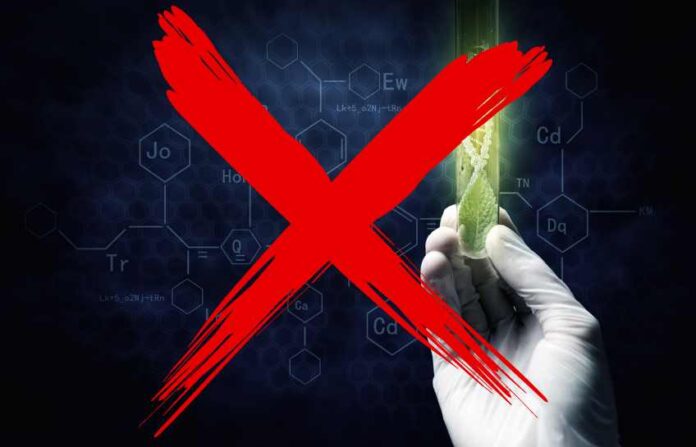The National Party, with the support of ACT, have announced that if elected, they will recklessly ignore the lessons of the pandemic
…by deregulating biotechnology based on imaginative but wholly unsubstantiated promises of benefit and over-simplified discredited ideas about how genes work.
This article is also available as a PDF document to print/download and share. You can also listen to an audio version here.
In fact, we know only a limited outline of how genes function. What we don’t know is a far larger area of knowledge than what we do know. Blinded by pride, biotechnology advocates are pretending to know far more than they do. They know very little, but incredibly have promised the public that they will soon cure all diseases. Tal Zac, CMO of Moderna, told a TED Talk in 2017
“…we are hacking the software of life, the genetic code, and that has profound implications for the cure of everything from flu to cancer.”
Heady stuff, but this is a fantasy more closely connected to Moderna’s commercial objectives and need for further funding, than it is to any reality.
Here Are Twenty Precautionary Scientific Reasons to Outlaw Biotechnology Experimentation:
1. Complexity: Diagrams used to promote novel genetic interventions over simplify genetic systems. There are about 10 billion atoms in a single chromosome (we have 46 of them) and more than 42 million proteins in a cell. The processes that connect these elements and render their functions stable and exact are multidimensional and only vaguely understood.
2. Precision: The idea that the genetic structures which support life arose from a series of random events has given rise to the idea that genes may be edited safely. In fact, genetic structures are hugely precise, replacing even a small sequence can overturn their function as a whole and give rise to inherited defects.
3. Containment: Laboratory accidents and organism escapes are far more common than we have been led to believe. Genetic material is highly mobile, and interactive. Under certain circumstances it can integrate into the human genome. Once released it cannot be recalled.
4. Intelligence: We have no idea how our awareness is supported by genes. Interfering with genetic functions can compromise our intelligence and even our humanity.
5. Multitasking: DNA is non-linear. Each gene performs many tasks in conjunction with other genes. They don’t operate alone. Editing genes inevitably causes off-target unintended mutagenic effects.
6. Epigenetics: Genes function as part of wider cellular, physiological and environmental systems. Even alterations to regulatory mechanisms in cells can permanently disrupt key ways genes express themselves.
7. Adverse Effects: Rates of adverse events associated with gene editing and therapy dwarf the rates of adverse effects from pharmaceutical medicines which are already unacceptably high and the third leading cause of death. An article in Nature 15 April 2021 concluded: “Gene-therapy trials are on the rise, but more needs to be done to understand the long-term risks associated with this type of treatment…..[there are] growing concerns about the late adverse effects.”
8. Regulation: Self-repair mechanisms in cells are designed to protect the integrity of genetic structures and carry out tens of thousands of repairs everyday in each cell. Deliberately introducing genetic changes amounts to bypassing these essential regulatory protections.
9. Electric Fields: Genes work in tandem with electromagnetic fields to ensure developmental stages follow a pattern. Altering genes or applying electromagnetic fields can stunt or alter developmental stages.
10. Chemistry: Cells constantly receive and send chemical signals and extract energy from the chemistry of food. The mechanisms that moderate the processes and transport pathways in the cell are little understood and certainly put at risk by genetic modification.
11. Shape: Shape is a fundamentally important molecular feature which determines interactions with cellular receptors, ion channels, enzymes, transporters and an array of other complex processes. Genetic modification can alter bio-molecular shape and hence block pathways vital for life.
12. Vibration: The transmission of information in cellular systems is believed to be based on emission and resonance of electromagnetic patterns in the infrared frequency range generated by the vibrations of molecules. Altering genes can alter resonant vibrational modes and hence their function.
13. Transcription Regulation: RNA is both the direct output of genetic information in DNA and it regulates the process of genetic expression. It is not clear which came first nor is the exact balance of their respective roles fully understood.
14. Identity: Each individual has a unique genetic identity. Editing genes alters our genetic identity and could alter our personal identity. Outcomes among organ transplants recipients indicate this can happen.
15. Nutrition: Health and immunity is known to be protected by diets high in fresh foods characterised by their natural genetic structure. Genetic modification can degrade natural nutritional profiles, and hence undermine health.
16. Cancer: There is an inherent risk of cancerous proliferation of gene-altered cells. A 2003 article in Nature concluded: “There is a risk of treatment-induced malignancy from retrovirally based gene therapies.…its spectre has always loomed over the field.”
17. Agriculture: Our food supply relies on a complex balance of factors underpinned by genetic structures with which we have co-evolved over very long periods of time. There is no justification to introduce unquantified risks into agricultural systems, nor are there demonstrated benefits from previous attempts to do so.
18. Pathogens: Gain of function research involving the mutation of pathogens is highly risky. We have little evolutionary context to fight off highly mutated pathogens. There are convincing reasons to finger genetic modification as the source of the Covid-19 pathogen.
19. Biosphere: The introduction every year of 2000 novel chemicals and biochemicals into our food, medicine, and the environment challenges the evolutionary stability of our symbiotic relationship with the biosphere upon which our health and survival depends. This has found expression in the rapidly growing incidence of chronic and inflammatory illness affecting more than 50% of individuals.
20. Compliance: Biotechnology regulation has proved in practice to be hard to police and enforce. The only sure way ahead is to outlaw experimentation.
The plan of the National Party and ACT is to deregulate biotechnology by ending the effective ban on gene editing and genetic modification in New Zealand. This runs contrary to available evidence and common sense. Biotechnology does not have any track record of economic, agricultural, or health benefits—the reverse is the case. No substantive evidence of safety or effectiveness has been presented to the public, nor does any exist.
Predatory commercial interests are trying to persuade governments to deregulate biotechnology. This process is being driven by the lure of vast profits for multinational corporations with government contracts, as has just happened during the pandemic. It is not in our national interest to deregulate biotechnology. There are continuing market opportunities for high quality natural food that we produce that are serving our nation well. Deregulation of biotechnology will damage our national agricultural brand and crucially put the health of the nation at risk.
So what should we do about politicians who put on a serious face and tell us we need to deregulate biotechnology to save the world? We need to laugh long and loud at them, they are not making any sense. I was heartened this week to watch the winning entry of Britain’s Got Talent—Viggo Venn, a clown. He made people laugh. We need a lot more of that.
Guy Hatchard, Ph.D., was formerly a senior manager at Genetic ID, a food testing and certification company (now known as FoodChain ID).
Guy is the author of Your DNA Diet: Leveraging the Power of Consciousness To Heal Ourselves and Our World. An Ayurvedic Blueprint For Health and Wellness.




